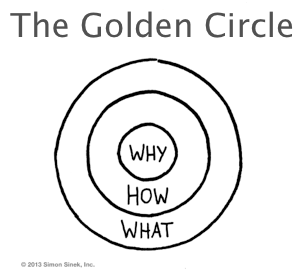Finding Your Why – How Mindfulness Can Help
By Christopher Joseph
Many of us now live what are often very busy lives in the frantic world we now find ourselves in, and as such we are often subject to constant distractions. As T. S. Eliot put it: we are “Distracted from distraction by distraction”.
Our attention can often feel pulled in many different directions as a result of living lives in the ‘fast lane’, and as such we can often lose sight of our why – why we’re actually doing the thing we’re doing!
But why is knowing ‘our why’ important?
When we are in touch with our reasons for doing something we have clarity of purpose, and there is greater alignment between our actions and our values, and as such we often feel less internal conflict, we are far more at ease and our energy and motivation for living can increase significantly. This doesn’t necessarily mean that we become less busy, but it does mean that we usually expend less energy since we are swimming with the flow rather than against it.
Simon Sinek in his TED  talk ‘Start With Why’ and in his book of the same title talks about the ‘Why, How, What’ golden circle (see picture). He talks about how companies and organisations often get lost in focusing on ‘What’ they do and sometimes ‘How’ they do it and as a result lose touch with the actual reason for being in business in the first place – i.e. their ‘Why’. He highlights the fact that most companies work from the outside in rather than starting with their why and working from the inside out.
talk ‘Start With Why’ and in his book of the same title talks about the ‘Why, How, What’ golden circle (see picture). He talks about how companies and organisations often get lost in focusing on ‘What’ they do and sometimes ‘How’ they do it and as a result lose touch with the actual reason for being in business in the first place – i.e. their ‘Why’. He highlights the fact that most companies work from the outside in rather than starting with their why and working from the inside out.
Whilst Simon presents the golden circle model primarily in respect to companies and organisations, it equally applies, in my opinion, to us as individuals in respect to the things we do. When undertaking any new venture in life I believe it’s important that we start with our why.
The mission statement of Breathworks, in its succinct form, is to relieve mental and physical suffering in this world. This is also my reason, my ‘Why’, for doing the work that I do.
It might sound a little grandiose but I have no illusions about suddenly waving a magic wand and solving the world’s ills! However, in beginning any one to one session, group course or entering any workplace to teach mindfulness I try and remember why I’m doing it – to help people develop their own mindfulness skills so that they can live their lives with more ease and less suffering.
Wherever possible I always try and start with my why, and when I forget it, as I invariable do sometimes, and get caught in the detail of ‘What’ I’m teaching or ‘How’ I’m teaching it, I try and return to the centre of my circle, as Simon Sinek portrays it.
So what is your ‘Why’?
This is a common question that often comes up in coaching sessions, and it can be a difficult one for people to answer. When we’re busy, and have little time to reflect, we can so easily lose touch with our why, with our original motivation for doing things.
We may forget that we may be doing the job that we’re doing to support our family, or we may forget that the volunteer work that we may be doing is to support and improve our community. We may forget that the personal exercise we undertake, sometimes begrudgingly, is to support ourselves physically, and we may forget that the purpose of our meditation practice is to support and nourish ourselves mentally and emotionally.
So, how can mindfulness help us in finding our ‘Why’?


If we take a glass of cloudy, muddy water and allow it to be still, without agitating it further, then the sediment will settle with time and the water will gradually become clearer and clearer (see pictures). This is a useful analogy for what can happen in our own minds when we meditate. Over time we can gain increased clarity on many things including our thoughts and emotions, our life situation and useful insights into the nature of our personality and what makes us tick – ‘Why’ we do the things we do.
These insights into the personal nature of our character and the traits and habits we have are not always easy to digest of course! The fifth step of the ‘Breathworks 5-Step Process of Mindfulness’ is choice, and in my personal experience, however, in the long run it’s always better to make choices and decisions from a position of awareness than unawareness. When I meditate, and thus provide the conditions for the ‘cloud of thoughts’ in my own mind to settle, as the mud settles in the water, then I can obtain a greater clarity of mind – I can see things more clearly. As a result I’m more able to connect with the deeper driving forces within me, with my core values, with my ‘Why’.
Every time, however, I let myself become distracted from the richness of my present moment experience to ruminative thoughts about the past or worries about the future I am in effect shaking the glass, and thus muddying the water. It’s no wonder therefore that through constant busyness and distraction we lose this clarity of mind, and become increasingly out of touch with our ‘Why’s’ – our reasons for doing the things we do.
So, how often do we let the glass settle? And, how can we let it settle a little bit more?
For me, personally, the answer has been through undertaking a regular mindfulness meditation practice, and also by allocating a space for personal reflection outside of my meditation practice.
Through undertaking regular meditation over a period of time it is possible to obtain greater clarity on all aspects of our mind, including the core values that drive us. When we couple this with a space for personal reflection we can enact choice and thus hopefully make better decisions about which actions to undertake in the future. In doing so we can live a life where our actions are more in line with our core values, a life that is a little easier, a little simpler and a lot richer and more pleasurable to live.